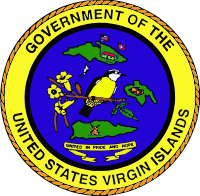Revised Organic Act of the Virgin Islands
 |
|---|
| This article is part of a series on the politics and government of the United States Virgin Islands |
|
Legislature
|
|
Judiciary
|
|
Divisions |
|
The Revised Organic Act of the Virgin Islands is a United States federal law that repealed and replaced the previous Organic Act of the Virgin Islands. It was passed on July 22, 1954 by the U.S. Congress. Like other organic acts it functions as a constitution for a territory of the United States.[1]
Provisions
The Revised Organic Act provides for:
- An executive branch headed by a governor elected by a majority of registered voters.
- A unicameral (single-body) legislature of 15 members, elected by the residents of the U.S. Virgin Islands. While this legislature largely creates the laws that govern the islands, the ultimate laws that govern are still those of the U.S. Congress, a body in which Virgin Islanders have no vote;
- A court system with judges appointed the governor;
- A Bill of Rights.
References
This article is issued from
Wikipedia.
The text is licensed under Creative Commons - Attribution - Sharealike.
Additional terms may apply for the media files.